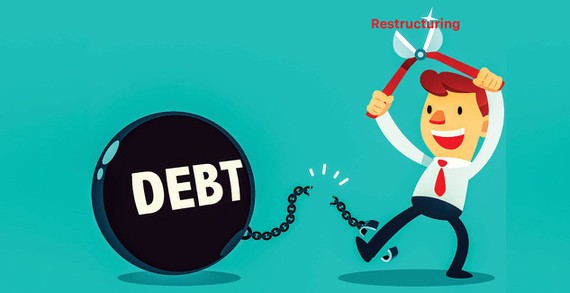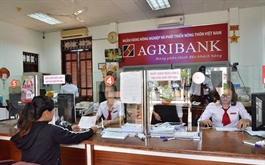Pandemic can worsen bad debt situation
Pandemic can worsen bad debt situation
The unpredictability of the Covid-19 pandemic will continue to impact the worsening situation of bad debts this year. Although, bad debts are currently being contained at a low level via Circular 01 issued by the State Bank of Vietnam in mid-March this year, which allows banks to restructure loan repayment terms, exempt and reduce interest fees, and keep all debt groups to support customers affected by the Covid-19 pandemic. However, it is clear that these measures are but temporary attempts to contain bad debts.
 |
Worsening situation
By the end of 2019, the problem of bad debts was seen as worsening. At the beginning of 2020, the State Bank of Vietnam (SBV) had set a target to bring the non-performing loan (NPL) ratio to below 2%. Generally, on-balance sheets, bad debt ratio of credit institutions, bad debt sold to Vietnam Asset Management Company (VAMC), and debt classification measures must be below 3%. However, due to the current ongoing Covid-19 pandemic, bad debts are being viewed with great trepidation. Some banks admitted in the second quarter that the Covid-19 pandemic has blown away all efforts made by the banking industry to tackle bad debts. The SBV also estimated that in the case of complicated and controlled transactions in the second quarter the NPL ratio will be close to 4% by the end of the second quarter and 3.7% at the end of 2020, or perhaps even higher. However, when the second wave of the pandemic broke out in Vietnam, difficulties of several businesses greatly intensified.
In fact, at the end of the second quarter of 2020, the bad debt problem began to re-appear aggressively. The absolute value of bad debt at Agribank increased by more than 39% to VND 24,464 bn, of which possible debt loss increased by VND 4,887 bn, upto VND 17,285 bn. Vietcombank NPL ratio increased from 0.79% to 0.83%, VietinBank increased from 1.16% at the beginning of the year to 1.7%, BIDV total bad debt increased by 17% and NPL ratio increased from 1.75% to 2%. The same situation prevailed across many joint stock commercial banks. According to Fiin Pro, in the second quarter, the bad debt ratio of 17 listed banks continued an uptrend from 1.44% at the end of the fourth quarter of 2019 to 1.71%. The new bad debt rate has increased to 0.22% in the first quarter and 0.1% in the second quarter, much higher compared to the same period in 2018 and 2019.
Accept current bad debts
Although bad debt tends to increase, according to experts, this is not a substantial increase. According to Circular 01/2020/TT-NHNN, banks can decide to restructure the repayment period and keep the debt group for customers affected by the Covid-19 pandemic. As of 13 July, credit institutions have rescheduled repayment terms for more than 272,000 customers with outstanding loans of more than VND 210,000 bn; and exempted or reduced interest rates for more than 435,000 customers with outstanding loans of VND 1,270 trillion. Accordingly, the State Bank of Vietnam continued to maintain NPL ratio on the balance sheet at less than 2%. This also means that without restructuring, the NPL ratio and the NPL creation rate will be higher in 2020.
According to Saigon Securities Incorporation (SSI) NPLs at the end of 2020 will increase by 17%, and 14% by 2021. According to BIDV Research and Training Institute, by the end of this year, the increase in non-performing loans in the whole banking industry may increase to 4%, higher than the level of 1.89% at the end of 2019.
At the end of May, the SBV issued a draft Circular amending Circular 01/2020 to seek comments, but the deadline for asking for comments has expired and upto now, though it has been four months, a new circular has not been issued. An economist said that the State Bank of Vietnam may reconsider because the Ministry of Finance supports the opinion of this draft circular, but it suggested that banks must assess the current situation and nature of debts. Specifically, properly classify debts, and set up full provisions to limit risks that may have repercussions later. In the current conditions, it is necessary to accept that bad debt will increase, because this is normal when the economy goes into crisis mode.
However, according to one expert, it is necessary to have a solution to control and balance the bad debt so that even if it increases, it can still be resolved when the economy recovers. If you impatiently try to recover the economy by restructuring debt, freezing debt to pump more cheap capital, as well as manage and supervise capital, then bad debts will increase sharply in the latter period. When the economy recovers once again, this situation will be difficult to resolve and bad debt will become an even greater burden. Therefore, how to accept bad debts in the economy this year will be an important task for all managers.
In Decree 81/2020, which amends and supplements a number of articles in Decree 163/2018 on the issuance of corporate bonds, there are provisions that will prove flexible for bad debt settlements. Specifically, Decree 81 has added provisions for bond issuance and information on investment programs and projects; production and business activities that need additional capital; and structured debts by capital from bond issuance.
According to Dr. Le Dat Chi, University of Economics in Ho Chi Minh City, at this time the State Bank of Vietnam should not extend Circular 01 because there will be problems with bad debts in coming time. Decree 81/2020 has allowed the issuance of corporate bonds to restructure debt, which is a solution to take advantage of, and businesses must associate with banks to implement this. Instead of unpaid debt, the enterprise must transfer that asset as collateral to issue one block of bonds and the bank can buy back the bonds.
Thus, it will help banks resolve debts, and businesses will avoid falling into a bad debt situation. On the other hand, short-term debts that are about to become bad debts will be converted to long-term debts by corporate bonds, and businesses will have no pressure to repay debts in the next twelve months.
























